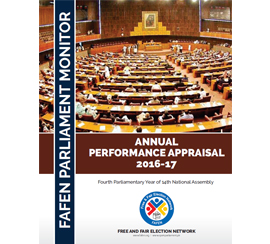- National Assembly passes 11 Private Members’ Bills
- Considerable improvement seen in committees’ output
- PM attends six, Leader of the Opposition 63 sittings
- No participation by 69 lawmakers throughout fourth parliamentary year
ISLAMABAD, June 3, 2017: The 14th National Assembly registered a decline in the attendance and participation of lawmakers in the House proceedings during the fourth parliamentary year as compared to the preceding years. The average attendance of the lawmakers per sitting was decreased from first year’s 65% to 60% this year. Similarly, the participation of active lawmakers was dropped from 304 to 270 in these four years. Around 69 lawmakers did not contribute to the parliamentary agenda or debates during this period. This was stated in the Fourth Annual Performance Appraisal Report of the National Assembly released by Free and Fair Election Network.
According to the report, the Assembly also witnessed decrease in the parliamentary interventions used for the executive oversight and public representation i.e. Calling Attention Notices (CANs), Motions under Rule 259 and Questions. The lawmakers raised 31% less CANs, 22% less Questions and 18% less Motions under Rule 259 during the reporting period as compared to the previous year. The Assembly took up 74% of its regular agenda while the remaining business was left unaddressed either due to the absence of concerned lawmakers or early adjournment of the proceedings.
The Assembly, however, marked slight improvement in the legislative output as compared to the preceding year by approving 61 bills. Last year, the House had approved 59 pieces of legislation. The uniqueness of this year’s legislation was the passage of 11 Private Members’ bills, as the Assembly did not pass any non-treasury legislation during the first three years of the National Assembly.
The output of various oversight committees also witnessed a considerable increase from 120 reports last year to 154 reports this year. The Assembly adopted 40 resolutions, among them 18 were sponsored by Private Members. The instances of protests, walkouts and identification of quorum were also enhanced during the reporting year. The lawmakers staged 53 protests and pointed out quorum 41 times, whereas these numbers remained 49 and 26, respectively last year.
The Assembly addressed the crucial issues of military courts, electoral reforms and FATA reforms amidst the increasing political friction during the year. The House approved the 28th Constitutional Amendment to extend the term of military courts for another two years. These courts were set up under the 21st Constitutional Amendment in January 2015 and became dysfunctional on the expiry of initial two-year term. However, this time, the Assembly established a Parliamentary Committee on National Security to review the performance of the military courts.
The House through legislative proposals addressed the issues of judicial reforms, economic and financial matters, institutional development and reforms and human rights. In addition, bills were passed on the subjects of security, education, health, governance, elections, accountability, environment, agriculture, parliamentary affairs and the prevention of electronic crimes. The government initiated legislation on the FATA reforms package by introducing the Constitution (Thirtieth) Amendment Bill, 2017 and the Tribal Rewaj Bill, 2017 to give effect to these reforms.
The Parliamentary Committee on the Electoral Reforms (PCER) presented its second interim report on the Draft Elections Bill, 2017 in December 2016. The government also moved an election-related constitutional amendment namely the Constitution (Twenty-seventh) Amendment Bill during the reporting year. However, the momentum for electoral reforms appeared to have receded in the latter half of year in the wake of political controversies gripping the Assembly’s proceedings and slowing down the progress on electoral reforms as well as the 27th constitutional amendment. The Draft Elections Bill, 2017 has yet not been introduced in the House.
The Assembly, through resolutions, made recommendations to the government on matters related to the governance and energy sectors, besides reflecting its resolve against terror-related issues. The lawmakers also reiterated their support to the Kashmiris against the ever-increasing human rights violations by Indian forces in the occupied valley. A joint session of the Parliament was specially convened to discuss the Kashmir issue and the Indian ceasefire violations along the Line of Control. The issue came under discussion through a Motion under Rule 259 and an Adjournment Motion as well.
The House witnessed a dozen of protests by the opposition lawmakers over the Panama Papers case, demanding the Prime Minister to resign. Following the Supreme Court’s verdict, the opposition tried to move a Privilege Motion against the Premier for making false statement on the floor of the House, while, the Chair did not allow the motion to be moved. The House rejected the opposition’s Panama Papers Inquiry Commission Bill initiated in the Senate and transmitted to the Lower House but approved the treasury’s legislation namely The Pakistan Commissions of Inquiry Bill.
The House made changes to the Rules of Procedure and Conduct of Business to give representation to the Senate in the Public Accounts Committee and improve the practices regarding Question Hour and the committees’ reports. The amendments to the rules of Question Hour were related to the online submission of questions’ notices, time period for submission of questions and the balloting of questions. Moreover, the House also bound the ministries to inform their relevant standing committees about the implementation of committees’ recommendations on the development-related budgetary proposals.
To download complete report, click here | To download Urdu Press Release, click here


